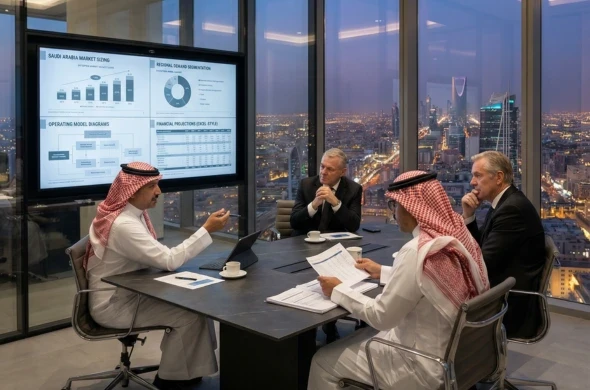Imagine you're sitting in your apartment, and you have the ability to enter, explore, and check the products at the Gucci or Armani stores. Or, someone from their US office could be holding a conference while being holographically projected in their client's Dubai office. That would be so convenient. The possibilities are numerous, and all of this is deemed to become a reality in a decade or so with the Metaverse.
What is the Metaverse?
The Metaverse is an internet-based digital experience that immerses users in a three-dimensional world. The term Metaverse refers to the concept of a shared virtual platform to which people can connect and move through digital environments. According to Meta (Facebook) CEO Mark Zuckerberg, the Metaverse is an embodied internet, where instead of just viewing content, you are in it.
The Metaverse will offer collaborative social spaces where a user can learn, work, shop, exercise, travel and do much more in groups or individually; without moving from his location. It is a virtual world powered by augmented reality (AR) and virtual reality (VR).
Who invented the Metaverse?
The concept of a metaverse originated in science fiction. The term was coined by Neal Stephenson in his 1992 novel Snow Crash, which featured Metaverse as immersive, interconnected virtual worlds. This has since become a cornerstone of science fiction.
In October 2021, Mark Zuckerberg renamed Facebook to Meta and announced the creation of a Metaverse that would completely transform the internet.
What are the characteristics of the Metaverse?
The Metaverse virtual worlds can be designed to look however the user want them to. However, there are a few key characteristics that will be common in all Metaverses:
- Interactive: The Metaverse is a dynamic environment that can be manipulated and interacted with in any way the users see fit. Limitations will decrease in time as the space develops.
- Life-like: The Metaverse spaces must appear hyper-realistic and conform to how humans perceive the world around them.
- Interoperable: Several companies are developing their interpretations of the Metaverse that are basically part of the same universe. Avatars and assets created in one can be used in another.
- Economic: The Metaverse is a fully functional economy in which goods are traded and services are offered digitally. Pertinently, ownership of goods in one Metaverse is transferable to another.
How Is the Metaverse impacting businesses?
The Metaverse concept is piquing the interest of investors and businesses eager to be a part of the next great thing.
Automotive & Machinery
With an industrial metaverse, manufacturers will not only use AR/VR for on-site auxiliary installations or skills training but will also be able to evaluate outcomes and fix problems in real-time without having to be present on-site.
Before transferring it to the physical world for actual production, the company's product design, development process, trial production testing, operation management, marketing, and others can be simulated and verified within the virtual community.
Real Estate
Similar to the current internet scenario in which we buy space for websites, in Metaverse, businesses will own space on the internet for a variety of purposes ranging from performing stages to exhibition spaces to universities.
Imagine a virtual concert held within a stage in the Metaverse. According to Epic Games, millions of people watched singer Ariana Grande virtually perform in Fortnite in September 2021. Similarely, consider an art gallery or a stadium where you can see things in real-time.
Retail & Consumer Brands
While a full-fledged Metaverse is a distant reality, several big e-commerce giants have already incorporated augmented reality into their online systems. Here are some notable examples:
- With applications from cosmetics giants like Mac, Maybelline, and Sephora, you can receive a virtual makeover to see what products and hues would look best on you.
- Apparel is more difficult to portray realistically in AR than other things, but you can digitally try on items from retailers like Gucci and Kohls. Nike also employs AR to measure the buyer's feet to match the right size of the footwear.
- With technologies like LensCrafters, Warby Parker, and Zenni Optical, you can visually test frames before ordering them online.
- AR apps from major retailers such as Amazon, Home Depot, IKEA, Target, and Wayfair allow you to see how furniture and décor products would look in your set-up.
- Second Life's goal is to give its users the ability to create a virtual representation of themselves, known as Avatars, and live their lives the way they want.
- Both Roblox and Epic Games have virtual worlds in which millions of people socialize, play, and participate in a digital economy. Some participants even make a living by selling digital goods within these metaverses.
- Fortnite began as a competitive video game but has since evolved into a real estate solution for hosting virtual events linked to real-world concerts, movies, and sports stadiums.
Financial Sectors
Banking and financial institutions worldwide have already begun to use AR and VR for a variety of applications such as strengthening customer relationships, providing training for improved performance, and providing clients with a comprehensive digital experience in the virtual world. For example, the Korean firm NH Investments and Securities has created its own Metaverse, dubbed NH Universe. Currently, around 2,000 customers can interact and take advantage of various services, such as investment analysis seminars.
What is the Metaverse consumer base going to look like?
The ability of the Metaverse to create a balanced world is seen as the greatest potential by many tech visionaries.
- No geographical boundaries. With the Metaverse being accessible from anywhere, these geographical obstacles will begin to break down. Students from any part of the world would attend a university of their choice by attending virtual classes. Employment opportunities will also not be restricted by physical locations.
- New graphics and UX/UI design skills will become key to keeping up with the Metaverse trends. AR and VR skills will become mandatory for employment in many IT sectors.
- For brands, the pool of potential customers will be much wider. Customers will sample and purchase products from anywhere in the world. This presents a huge opportunity for brands that can develop and market their products to a much larger audience in virtual worlds.
How will IPs be protected in the Metaverse?
How do brands protect themselves against counterfeiting or copying in an interconnected, cross-jurisdictional virtual world? With the click, data can be copied.
Currently, non-fungible tokens (NFTs) are a solution to this. NFTs rely on complex blockchain methodology to ensure digital creations are one-of-a-kind or are limited editions. As a result, NFTs can be used to provide perceived security to digital goods. Given that internet security is already a considerable challenge, we can expect more solutions to come up in the future.
What are the perceived major concerns of the Metaverse?
We already seen a decline in physical stores after Covid. With Metaverse, demand may fall even further. While commuting and printing documents may become minimal, a significant increase in electricity consumption and the production of AR and VR devices will impact the global environment. Protecting children from adult content will be a major challenge. Ailments associated with immobility may arise as a result of limited physical movement.
There has been an increase in the demand for methods to make online interactions more realistic. It is still too early to determine how the Metaverse will be handled and what laws will govern it.
Technology Consulting Services | Retail Consulting Services | Consumer Goods Consulting
At Ollen Group, our technology and strategy consultancy services are up to date with consumer shifts in the Middle East, and the necessary steps needed to find success in the future - including the development of different aspects to be part of the metaverse and cope with the demand for digital progression. Ollen Group technology consultancy services, retail consultancy services and consumer goods consultancy services offer turnkey solutions from strategy to execution, as well as design, development, and deployment.
Read our latest insights, ideas, and perspectives that explore the trends shaping the future of business and society. Our consultancy services go hand-in-hand with these insights, confirming our position as industry leaders. Get in touch to find out more about our consulting services and industry expertise.



